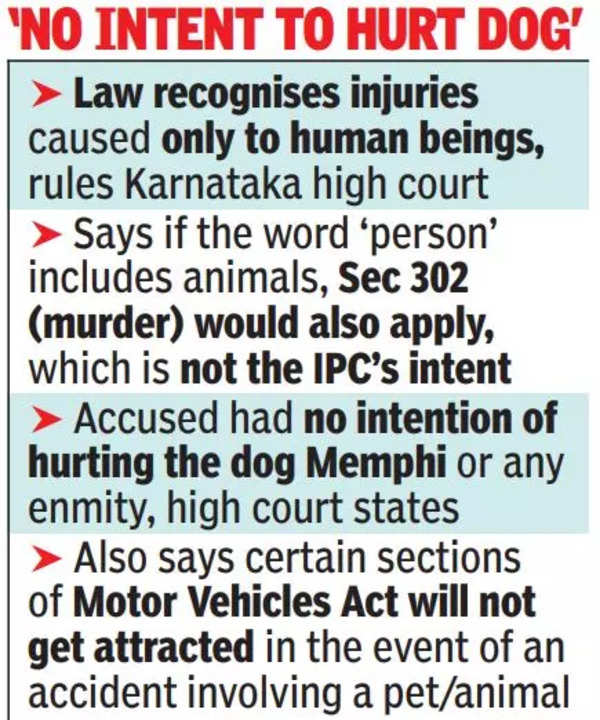IPC Section 279 relates to “rash driving or riding on a public way” and a person found guilty can be punished with imprisonment up to six months or/and a fine of up to Rs 1,000.

While allowing a petition filed by Prathap Kumar Ga resident of Kurubarahalli in Bengaluru city who was accused of knocking down a pet dog in February 2018, Justice Suraj Govindaraj has observed in his October 21 order that the IPC section has the heading ‘rash driving or riding on a public way’ but “does not recognise and/or make an offence (of) any injury caused otherwise than to a human being”.
Thus, as far as the injury or death caused to the pet or animal is concerned, “the same would not amount to an offence in terms of IPC Sec 279,” the order said.
Referring to an observation by the Supreme Court — “no creature is superior to any human being and animals are to be treated equally, and that even animals have a right to life” — cited by the complainant, the judge has pointed out that the said observation was with reference to sections 3 and 11 of the Prevention of Cruelty to Animals Act.
“The observation cannot be made applicable to Section 279 of IPC… unless the provision makes a particular act an offence. (As it stands), section cannot be extended to any injury or death caused to an animal. If the submission (of the complainant’s counsel) is accepted and the word ‘person’ is interpreted to include an animal, then Section 302 (pertaining to murder) would also be attracted, which is not the purport and intent of the IPC,” the judge noted.
The judge said that for invoking IPC Sections 428 (mischief by killing or maiming animal of the value of Rs 10) or 429 (mischief by killing or maiming cattle, etc., of any value or any animal of the value of Rs 50), it is required that mens rea, animus or intention, is required to be established.
“In the present case, admittedly, the petitioner is not known to the complainant and/or his family members, nor that the petitioner has any enmity with the deceased pet dog, Memphi. Hence, there cannot be any animus in existence in the petitioner to cause the death of the said pet Memphi,” the judge noted in his order.
Justice Suraj Govindaraj also said that Sections 134 (a) or (b) of the Motor Vehicles Act would not get attracted in the event of an accident involving a pet/animal.
“Sections 134 (a) and (b) of the MV Act only speak of securing medical attention for the injured person. In the present case, if the pet/animal is regarded to be a property of a third party, there is no offence as such made out in terms of Section 134 (a) or (b) of the MV Act as regards the damage to such property of a third party. The said provision relates only to injury to a person, a dog/animal not being a person would not come within the ambit of Section 134 (a) and (b) of the MV Act,” the judge said.
In his complaint, Dilraj Rakhejaalso from Kurubarahalli, had alleged that between 8.15pm and 9pm on February 24, 2018, his mother had taken her two pet dogs for a walk and an SUV hit one of the pets. The complainant’s brother-in-law and sister took Memphi to a veterinary clinic where the three-year-old dog was declared dead.
Based on a complaint, Vijayanagar police registered an FIR against SUV driver Prathap for offences punishable under sections 134 (A & B) and 187 of the Motor Vehicles Act, 1988 and sections 279, 428 and 429 of the IPC. A chargesheet was also filed before a metropolitan magistrate court in Bengaluru city.
Challenging the same, Prathap Kumar claimed he was innocent and had no mens rea to cause injury or harm to the pet dog. According to him, the dog was on the road while he was driving, resulting in the accident.






